
In Grenada, where rainbow-colored fish swim in clear turquoise waters, and hills and valleys sprout verdant fruit trees, second-year School of Public Health graduate student Heather Olden had work to do during spring break.
Her SPH Public Health Action Support Team had prepared a workshop curriculum for resort managers. They were seeking education for employees on cancer screening, diabetes, cardiovascular disease, diet and exercise.
“Once we arrived, we had a meeting with the resort managers and talked about what they wanted from us as clients. That night, we reorganized the workshop,” she recalled. “By making our education modules more culturally relevant, the information was better received.”
First-year School of Information graduate student Meg Morrissey spent spring break working within the stately art deco surroundings of the Georgetown University Law Center in the heart of Washington, D.C., on an information preservation project.
Morrissey spent part of her time studying meta data and XML computer code. “These are difficult concepts to grasp unless you get your hands dirty, and I’ve been able to do just that,” she says.
Olden and Morrissey were among hundreds of U-M students who traded the traditional sun and fun spring break experience for a chance to perform service projects organized by several schools and units. Many find valuable instruction in their field while seizing the opportunity for engaged learning.
The unit supporting the largest number of students in alternative spring break activities was the Ginsberg Center’s SERVE office, part of the university’s Student Life. More than 375 students participated as U-M’s Alternative Spring Break sent groups of students on 30 different trips around the country — from Austin, Texas, to Hubert, N.C., to New York City, says senior Emma Kahle, an education and training coordinator with the ASB lead team.
The program has grown from just two trips of 15 people each traveling in Michigan in the late 1980s, to years when more than 40 trips took place. “The past few years we have been sending out between 25 and 30 trips, but we are still the largest alternative spring break program in the state,” Kahle says.
SERVE students spent the first week in March on activities including tutoring, gardening, working on homes or other structures, and food packaging or delivery.
In 1999, 11 students participated in the first School of Information Alternative Spring Break program. Katie Dunn, SI career counselor, says 96 students participated in the school’s spring break program this year. They traveled to Chicago, Detroit, New York and Washington, D.C. Among the many projects offered this year, a group of students in Chicago completed usability testing for Illinois Legal Aid Online, while students in Detroit worked to digitize materials for the Detroit Historical Society.
SI’s Morrissey said her spring break experience in Washington revealed she needs to learn more programming and markup languages. “I’m going home with a list of what I need to get familiar with before I set out on the job hunt next year,” she said.
The SPH Office of Public Health Practice has for several years organized spring break trips to locations ranging from the New Orleans and the Gulf Coast region, after Hurricane Katrina, to China. Tiffany J. Huang, an SPH graduate student, was part of the group joining the school’s Public Health Action Support Team in Grenada. SPH also sent a team to Texas this year.
Huang met with senior officials in the Grenada Ministry of Health and the Drug Control Secretariat, and with faculty and students from St. George’s University. The SPH team helped develop a first draft of the nation’s alcohol policy.
“Grenada hopes to become a regional leader in developing alcohol policy, and it was exciting to help support them in their efforts,” she says. “There’s no substitute for on-the-ground experience when working in public health, especially globally.”
Billy Cedar, a St. Clair junior and business administration major in the Stephen M. Ross School of Business, headed out on a nine-day trip to perform service work with the group Students Today Leaders Forever.
The nonprofit organization based in Minneapolis this year established a U-M chapter. It sent a bus with 15 U-M students to Louisville, Ky., Nashville, Tenn., Asheville, N.C., Charleston, S.C., and Savannah and Atlanta, Ga. Service projects on the trip included removing invasive species from a state park to planting trees and removing trash near a riverbank.
In Atlanta, the Michigan contingent met up with other Students Today groups sending buses of alternate spring break students representing other universities across the country, to perform a tree and grass planting project.
“There were almost 200 people there. It was really cool to see students from different universities working toward a common goal,” Cedar said.



